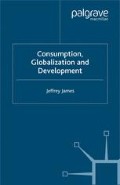Abstract
At several points in the first part of the book, we emphasized how rapid has been the growth of the mass-media in developing countries over the past ten to fifteen years. Such rapidity, we further suggested, was due both to developments in information technology (such as cable and satellite television) and a shift from a public to a commercial mode of television broadcasting. And following the prevailing view in the literature, we concluded that the extra programming capacity thus created would tend to be filled by imported serials and other low-cost programming from the developed countries, especially the United States. Indeed, it has long been
axiomatic that the international circulation of television programming occurs from north to south and from west to east: that is to say, US and, to a lesser degree, European program producers maintain their hegemony over the global television market by selling their programs at a low cost to foreign broadcasters, particularly to broadcasters in the ‘developing’ nations of Latin America, Asia, and Africa. They can do so because their production costs have been recovered in the far larger and richer domestic markets. Thus prices for foreign sales can be kept at a level low enough to discourage domestic drama production elsewhere but still high enough to be profitable to the producer. (Allen, 1995: 13)
Access this chapter
Tax calculation will be finalised at checkout
Purchases are for personal use only
Preview
Unable to display preview. Download preview PDF.
References
R. Allen (1995). ‘Introduction’, in R. Allen (ed.), To Be Continued … Soap Operas Around the World, Routledge.
J. M. Barbero (1995). ‘Memory and Form in the Latin American Soap Opera’, in R. Allen (ed.), To Be Continued … Soap Operas Around the World, Routledge.
C. Barker (1997). Global Television, Blackwell.
S. Boafo (1991). ‘Communication Technology and Dependent Development in Sub-Saharan Africa’, in G. Sussman and J. Lent (eds), Transnational Communications, Sage.
J. Katz (ed.) (1987). Technology Generation in Latin American Manufacturing, Macmillan Press.
A. Lopez (1995). ‘Our Welcomed Guests: Telenovelas in Latin America’, in R. Allen (ed.), To Be Continued … Soap Operas Around the World, Routledge.
R. Neto (1997). ‘Case Study: TV Globo — The Brazilian Media Giant’, The International Executive, 39 (2), March/April.
O. Oliveira (1993). ‘Brazilian Soaps outshine Hollywood: Is Cultural Imperialism Fading Out?’, in K. Nordenstreng and H. Schiller (eds), Beyond National Sovereignty: International Communication in the 1990s, Ablex Publishing Company.
G. Reeves (1993). Communications and the Third World, Routledge.
J. Straubhaar (1982). ‘The Development of the Telenovela as the Pre-Eminent Form of Popular Culture in Brazil’, Studies in Latin American Popular Culture, 1.
J. Straubhaar (1988). ‘The Reflection of the Brazilian Political Opening in the Telenovela, 1974–1985’, Studies in Latin American Popular Culture, 7.
N. Vink (1988). The Telenovela and Emancipation, Royal Tropical Institute, Amsterdam.
Author information
Authors and Affiliations
Copyright information
© 2000 Jeffrey James
About this chapter
Cite this chapter
James, J. (2000). Cultural Advantage Reversal: the Case of Telenovelas in Brazil. In: Consumption, Globalization and Development. Palgrave Macmillan, London. https://doi.org/10.1057/9780230510951_7
Download citation
DOI: https://doi.org/10.1057/9780230510951_7
Publisher Name: Palgrave Macmillan, London
Print ISBN: 978-1-349-41571-7
Online ISBN: 978-0-230-51095-1
eBook Packages: Palgrave Economics & Finance CollectionEconomics and Finance (R0)

